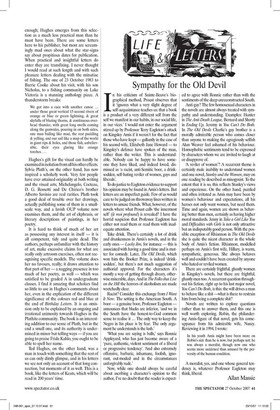Sympathy for the Old Devil
1 n his criticism of Sainte-Beuve's biographical method, Proust observes that it 'ignores what a very slight degree of self-acquaintance teaches us: that a book is a product of a very different self from the self we manifest in our habits, in our social life, in our vices.' I would not enter the argument stirred up by Professor Terry Eagleton's attack on Kingsley Amis if it weren't for the fact that those who have leapt — gallantly in the case of his second wife, Elizabeth Jane Howard — to Kingsley's defence have spoken of the man, rather than the writer. This is understandable. Nobody can be happy to have someone they have liked, and indeed loved, dismissed as 'a racist, anti-Semitic boor, a drinksodden, self-hating reviler of women, gays and liberals'.
To do justice to Eagleton evidence to support his opinion may be found in Amis's letters. But letters are an imperfect guide. Few of us would care to be judged on throwaway lines written in letters to amuse friends. What, however, of the novels where what Proust calls `the innermost self' (le moi profound) is revealed? I have the horrid suspicion that Professor Eagleton has either not read them or read them with inadequate attention.
Take drink. There's certainly a lot of drink and drunkenness in Amis's novels, and in the early ones —Lucky Jim, for instance — this is associated with having a good time and is matter for comedy. Later, The Old Devils, which won him the Booker Prize, is indeed 'drinksodden', but there's not much suggestion of authorial approval. For the characters it's mostly a way of getting through dreary, otherwise miserable, days. And in The Folks that Live on the Hill the horrors of alcoholism are made wretchedly clear.
Racist? Consider this exchange from I Want It Now. The setting is the American South. A boor — a genuine boor, Professor Eagleton — announces that blacks are inferior, 'and we in the South have the honest-to-God common sense to realise it ... The only way to keep the Negro in his place is by fear. The only argument he understands is the lash.'
'What you are saying is balls,' says Ronnie Appleyard, who has just become aware of a 'pure, authentic, violent sentiment of a liberal or progressive tendency'. 'And also extremely offensive, barbaric, inhumane, foolish, ignorant, out-moded and in the circumstances unforgivably rude.'
Now, while one should always be careful about ascribing a character's opinion to the author, I've no doubt that the reader is expected to agree with Ronnie rather than with the sentiments of the deep unreconstructed South.
Anti-gay? The few homosexual characters in the novels are almost always treated with sympathy and understanding. Examples: Hunter in The Anti-Death League, Bernard and Shorty in Ending Up, Jeremy in You Can't Do Both. In The Old Devils Charlie's gay brother is a morally admirable person who comes closer than anyone to making the egregiously selfish Alun Weaver feel ashamed of his behaviour. Homophobic sentiments tend to be expressed by characters whom we are invited to laugh at or disapprove of.
'A reviler of women'? A recurrent theme is certainly male inability to understand women and one novel, Stanley and the Women, may on one reading be described as misogynist. To the extent that it is so, this reflects Stanley's views and experience. On the other hand, puzzled and often irritated as Amis may have been by women's behaviour and expectations, all his heroes not only want women, but need them. Time and again, women are shown as behaving better than men, certainly as having higher moral standards. Jenny in Take a Girl Like You and Difficulties with Girls is not only attractive but an indisputably good person. With the possible exception of Rhiannon in The Old Devils she is quite the nicest character in the whole body of Amis's fiction. Rhiannon, modelled perhaps on Amis's first wife, Hillary, is warm, sympathetic, generous. She always behaves well and couldn't have been created by anyone who hated or reviled women.
There are certainly frightful, ghastly women in Kingsley's novels, but there are frightful, ghastly men too. A recurrent question throughout his fiction, right up to his last major novel, You Can't Do Both, is this: the will drives a man to behave like a shit —what is there to restrain him from being a complete shit?
Novels are written to explore questions rather than to answer them, and this one is well worth exploring. Robin, the philandering Amis-figure of that novel, gets his comeuppance from his admirable wife, Nancy. Reviewing it in 1994, I wrote: In his youth Antis might have been more on Robin's side than he is now, but perhaps not; he was always a moralist, though now one who seems more saddened than amused by the perversity of the human condition.
A moralist, yes, and one whose general ten- dency is, whatever Professor Eagleton may think, liberal. Allan Massie


































































 Previous page
Previous page